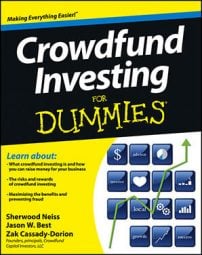In the private market, securities (either debt or equity) tend to be illiquid (meaning harder to sell) because there may not be an established market for those securities. As a result, when you commit to crowdfund investing, you must think differently about how and when you hope to get your money back and/or see a return on your investments.
Stay put for at least a year
One of the most important things to know about crowdfund investment is that you must hold such an equity investment for at least 12 months from the time of purchase. By law, the equity investment is illiquid for the first 12 months. (And in almost all cases, debt-based crowdfund investments will have repayment terms that last more than one year.)
This one-year hold period is an important part of the JOBS Act because it reduces the chances of pump-and-dump schemes, which use hype and misinformation to pump up a private company’s stock price (above its true value) so the instigators of the scheme can then dump their shares and receive large profits (to the detriment of other investors).
This provision disallows anything that looks like day trading and promotes a buy-and-hold investment philosophy.
Even after the 12-month holding period is over, you may find selling your shares or your debt to be a challenge. The SEC sets rules about how your sale can take place and what kinds of private shares stock markets can be used for this purpose.
Great new innovations will take place to benefit private companies and crowdfund investors who require secondary markets for such sales. These secondary markets already exist for other shares of commonly known, hyper-growth private companies (like Twitter or Socialcam), which is good news. What you still need to find out is how shares of crowdfund investing companies will trade on these exchanges.
Look for signs that it’s time to jump ship
After your 12-month holding period has expired, you’ll be wise to watch for signs that indicate whether it’s time to sell your crowdfund securities or whether the company is growing as expected. The biggest sign of trouble would be if the entrepreneur hasn’t met any of the stated benchmarks for the previous 12 months and is still a long way from making a return on your dollar.
If that’s the case, you have to decide if it’s best for you to sell your shares, recover whatever you can, and move on, or if you’d be better off staying put. The type and amount of communication that you’ve received from the entrepreneur is important as well.
If he’s a long way from reaching his goals but he’s given you solid reasons why all throughout the 12-month period, it may be wise to stick around a little longer.
Keep in mind that turning a profit almost always takes longer than originally planned; unexpected costs and problems almost always arise. How the entrepreneur deals with these unexpected situations may be the most important indicator of how you should act.
If you’ve been constantly disappointed with the entrepreneur for 12 months, the time to jump ship is now. If the entrepreneur has communicated effectively with investors, explained the unexpected issues and how they’re being resolved, and done some reforecasting so you know when profits may be arriving, you may have enough faith in him to stick with the investment.
Achieve the greatest profits from a success story
To really benefit from a crowdfund investment, you need to get in and stay in. You won’t make a quick buck with this type of investment, but if you keep your eyes on the long-term prize and ride the waves of volatility, you may reap some major rewards.
For example, a major individual investor or a larger business may purchase the company, the company may take its stock public, or you may simply collect very healthy dividends for years to come.
Of course, not every investment you make will carry the “major rewards” potential. After a year or more of being involved as an investor, you’ll have a strong sense of which investments are poised for greatness and which are going to stink up your portfolio.
Your best bet when it comes to achieving the greatest long-term profits is to consider yourself part of the business. Consider your cash investment as only one part; the other part is the active role you play in marketing the business, the idea, and the entrepreneur. Your marketing efforts help build value in the business that the business may not otherwise achieve.
When it eventually comes time for you to exit, a buyer (of the company’s stock or of the entire company) will look at the strategic value this purchase brings. For example, if you and the other investors can show an acquirer where the company’s strategic value exists outside of its profit and loss, your payoff will increase.

